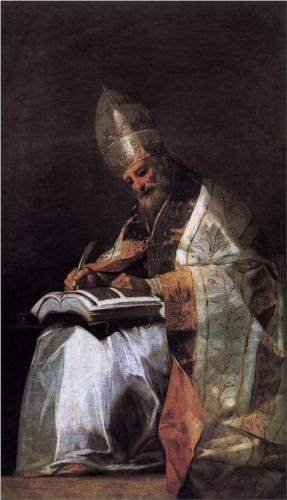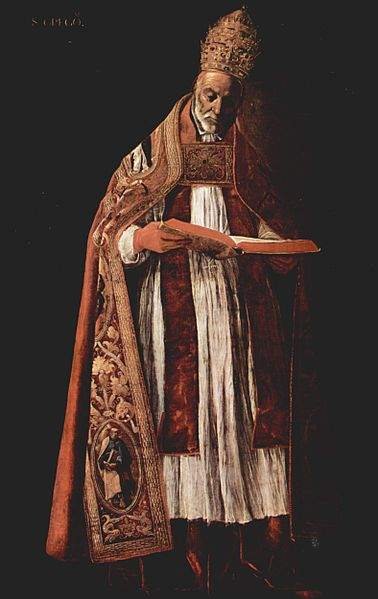
St. Gregory the Great, by Francisco Goya (1797). (WikiPaintings.org)
I’ve been having a rough time. I meant to post yesterday about Pope St. Gregory the Great (c. 540–604, r. 590-604)*, one of my most cherished popes and Church Fathers, but alas, my day was waylaid. Yesterday was his feast day — but I shouldn’t be such a perfectionist. It is worthwhile to write about him today or any day, and I am sure he appreciates being honored just as well.
* The Wikipedia article is pretty bad; you might be better off reading the Catholic Encyclopedia article.
There is so much I admire about this man, and so much I could say, but to do him a worthy tribute would require a lot more research and effort than I have time right now. He is called the father of the medieval papacy, for he did more to establish the role of the pope than anybody since Leo the Great. He stands at the juncture between the ancient world and the Middle Ages more clearly than anybody else, as old Rome decayed and passed away and the Church stepped forward to fill the void in the West. Historians know so much about him, and have written so much about him, because he left so much for us to read: over 800 letters documenting his correspondence with bishops and missionaries and kings and emperors all across the known world. He powerfully reasserted the missionary calling of the Church, and dispatched St. Augustine of Canterbury to return the Gospel to the English people, of whom he famously wrote (as recounted by Bede) that the fair-haired Angli (Angles) resembled angeli (angels), when he encountered a group of English boys in a Roman slave market.

Gregory the Great, by Francisco de Zurbarán (1627). (Wikipedia)
Gregory’s writings reveal him to be a man of passionate faith and a great care for souls, deeply learned but also deeply humble. Born to a wealthy and prominent Roman family, he sold all his family’s goods to benefit the poor and establish monasteries. He himself spent a third of his life in monastic service, and even as pope he maintained an austere mode of life. He is the first pope to stress his position as servus servorum Dei, the “servant of the servants of God,” a title he exemplified, and one so favored by his successor Pope John Paul II of blessed memory. He is the patron of both students and teachers, and very close to my heart.
Below is an excerpt of one of Gregory’s most famous letters, in which he gently rebuffed the Byzantine empress Constantina, who had written to him demanding a relic of St. Paul for a church she had constructed. This letter is important for documenting the veneration of the relics of Saints Peter and Paul in Gregory’s time, and is of particular interest to my research on the tomb of St. Peter. I translated this letter once for my Medieval Latin course; but the below is not my translation.

St. Gregory the Great (c. 1610), from the workshop of Carlo Saraceni. (Wikipedia)
The Serenity of your Piety, conspicuous for religious zeal and love of holiness, has charged me with your commands to send to you the head of Saint Paul, or some other part of his body, for the church which is being built in honour of the same Saint Paul in the palace. And, being desirous of receiving commands from you, by exhibiting the most ready obedience to which I might the more provoke your favour towards me, I am all the more distressed that I neither can nor dare do what you enjoin. For the bodies of the apostles Saint Peter and Saint Paul glitter with so great miracles and terrors in their churches that one cannot even go to pray there without great fear. In short, when my predecessor, of blessed memory, was desirous of changing the silver which was over the most sacred body of the blessed apostle Peter, though at a distance of almost fifteen feet from the same body, a sign of no small dreadfulness appeared to him. Nay, I too wished in like manner to amend something not far from the most sacred body of Saint Paul the apostle; and, it being necessary to dig to some depth near his sepulchre, the superintendent of that place found some bones, which were not indeed connected with the same sepulchre; but, inasmuch as he presumed to lift them and transfer them to another place, certain awful signs appeared, and he died suddenly.
Besides all this, when my predecessor, of holy memory, was desiring in like manner to make some improvements not far from the body of Saint Laurence the martyr, it not being known where the venerable body was laid, diggings were made in the course of search, and suddenly his sepulchre was unawares disclosed; and those who were present and working, monks and mansionarii , who saw the body of the same martyr, which they did not indeed presume to touch, all died within ten days, so that none might survive who had seen the holy body of that righteous man. . . .
Who then, most serene lady, can there be so venturesome as, knowing these things, to presume, I do not say to touch their bodies, but even at all to look at them? Such orders therefore having been given me by you, which I could by no means have obeyed, it has not, so far as I find, been of your own motion; but certain men have wished to stir up your Piety against me, so as to withdraw from me (which God forbid) the favour of your good will, and have therefore sought out a point in which I might be found as if disobedient to you. But I trust in Almighty God that your most kind good will is in no way being stolen away from me, and that you will always have with you the power of the holy apostles, whom with all your heart and mind you love, not from their bodily presence, but from their protection.
Moreover, the napkin, which you have likewise ordered to be sent you, is with his body, and so cannot be touched, as his body cannot be approached. But since so religious a desire of my most serene lady ought not to be wholly unsatisfied, I will make haste to transmit to you some portion of the chains which Saint Peter the apostle himself bore on his neck and his hands, from which many miracles are displayed among the people; if at least I should succeed in removing it by filing. For, while many come frequently to seek a blessing from these same chains, in the hope of receiving a little part of the filings, a priest attends with a file, and in the case of some seekers a portion comes off so quickly from these chains that there is no delay: but in the case of other seekers the file is drawn for long over the chains, and yet nothing can be got from them. In the month of June, Indiction 12. (Register of Letters, Book IV, Letter 30)
